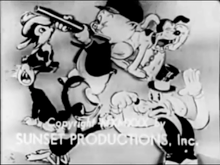Sunset Productions
Sunset Productions was a television syndication division of Guild Films which existed in the 1950s.

Overview
Sunset Productions is best known as the company identified in the copyright notice on a package of black-and-white Warner Bros. Pictures cartoons distributed in television syndication beginning in 1955, which were sold to Guild Films.[1] This package consisted of the black-and-white Looney Tunes, plus all black-and-white Merrie Melodies after the Harman-Ising era, 191 cartoons in all. The remaining pre-August 1948[2] cartoons (which included all color releases from that period, plus the Harman-Ising Merrie Melodies minus Lady, Play Your Mandolin!) were sold to Associated Artists Productions (a.a.p.) in 1956.
New opening and closing titles were made to remove any references to the original studio because at the time, Warner Bros. did not want to be associated with television. Because of this, any Warner Bros. references in the cartoons themselves were also removed – such as in Porky in Wackyland, where the dodo zooms up with the WB Shield to hit Porky Pig with a slingshot, then zooms back out.
A peculiar error is consistently seen on the copyright notices on Sunset Productions title cards, in which the copyright date is incorrectly rendered in Roman numerals as "MXM..." rather than the correct "MCM..." (i.e. MXMXLI for 1941).
The actual distribution was handled by Guild Films. Sunset was dissolved by Warner Bros. in the late 1950s; Guild Films shut down in 1961, and Warner Bros. sold TV rights to the cartoons to Seven Arts Productions. In 1967, Seven Arts bought Warner Bros. and became Warner Bros.-Seven Arts; at this point, Warner Bros. regained TV distribution rights to these cartoons.
Soon after the WB-7A merger was complete, the studio had 79 of these black-and-white cartoons redrawn in color due to the increased demand for color cartoons by TV stations; these colorizations, produced in South Korea by Fred Ladd, have often been criticized for their inferiority to the original animation. The same 79 cartoons were colorized again in the early 1990s (along with 25 other cartoons not redrawn in 1968), this time using a computer to add color to the cartoons, thus preserving the original animation, but still the cartoons were shown in a way they were not meant to be seen. Some of the computer-colorized versions mistakenly use the 1936–37 Looney Tunes opening theme (also known as the "Porky Signature") for the 1941–42 cartoons instead of "The Merry-Go-Round Broke Down" (possibly due to an oversight). Time Warner wouldn't own the a.a.p. Warner Bros. cartoons until 1996, when they merged with Turner Broadcasting System, owner of the a.a.p. package (via Turner Entertainment Co.).
Today, when using the terms "pre-August 1948"[2] and "post-July 1948"[3] to describe the television packages of Warner Bros. cartoons, the former is usually used exclusively to refer to those cartoons in the a.a.p. package, and excluding the cartoons sold to Sunset Productions.
See also
Notes
- ↑ Nielsen Business Media, Inc (1955-02-19). "Billboard".
- 1 2 The latest released Warner Bros. cartoon sold to a.a.p. up-to-date is Haredevil Hare, released on July 24, 1948.
- ↑ The earliest-released color cartoon to have been retained by Warner Bros. over the years is You Were Never Duckier, released on August 1, 1948.